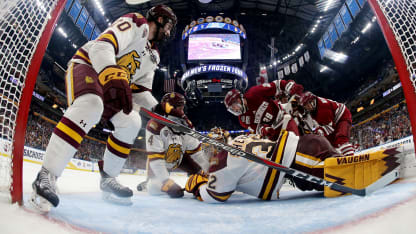The new legislation, which will go into effect May 1, calls for no recruiting conversations until Jan. 1 of a player's sophomore (grade 10) school year, as well as no verbal offers (commitments) made to a player until Aug. 1 before the player's junior (grade 11) school year. Under the old guidelines, players could initiate communication at any time, and verbal offers could be made anytime.
"All of us involved in college hockey are excited about these changes," said Mike Snee, executive director of College Hockey Inc. "Early recruiting and especially early committing in college athletics does not put young aspiring athletes in a healthy or fair spot. We're proud that college hockey is on the leading edge of addressing this issue."
Pat LaFontaine, a member of the Hockey Hall of Fame and a consultant for the NHL, said the NCAA changes conform to the standards set by the Declaration of Principles, unveiled by the NHL and NHL Players' Assocation, on Sept. 6, 2017.
"Hockey programs should be age-appropriate for all players, accounting for each individual's physical, emotional and cognitive development, and a lot of these young kids who are developing are not ready for this kind of attention as young teenagers," LaFontaine said. "This new legislation gives these teenagers and their families more time to enjoy the hockey experience and still develop, and not feel like they have the weight of the world.
"It's so important to play this great game of hockey without having to think too far ahead; these things happen naturally, so this is a positive step in the right direction."
The Declaration of Principles was developed by and for 17 hockey stakeholders, including the NCAA, to advance policies, programs and initiatives to create the best possible experience for the entire hockey community.
"The college hockey community recognized that recruiting has accelerated to a point that isn't healthy for prospects, our programs or the sport as a whole," said Josh Fenton, commissioner of the National Collegiate Hockey Conference and chair of a committee of coaches and administrators that developed the rule change proposal. "We are committed to improving the recruiting landscape for prospects, families and coaches, and believe these changes will make a significant impact."
While the average age of a Division I men's hockey player committing to a college is 18, the number of commitments from prospects as young as 14 or 15 years old has increased in recent years, according to College Hockey Inc. With teams now unable to make offers to players that young, the leaders in the sport at all levels hope the recruiting environment will improve.
"It will allow kids to focus on playing and not get wrapped up in the craziness when they hear of a friend committing to a college when they're 13," said Kevin Westgarth, vice president of business development & international affairs for the NHL. "It allows us to be able to turn up the dial from a development standpoint and let it be a little more fun and less serious for a little bit longer, and that's critical."

